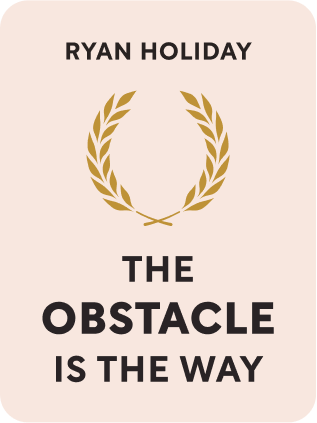

This article is an excerpt from the Shortform book guide to "The Obstacle Is The Way" by Ryan Holiday. Shortform has the world's best summaries and analyses of books you should be reading.
Like this article? Sign up for a free trial here .
What does Stoicism have to say about problem-solving? What would a true Stoic do when faced with a problem in life?
The cornerstone of the Stoics’ problem-solving philosophy is that you can find a silver lining in any circumstance in your life, no matter how dire it seems. Even if the only benefit you can find in an obstacle is an opportunity to practice acting virtuously, for instance, by restraining your anger or forgiving a misdeed, you’ve gained something of value.
With this in mind, here’s how to solve problems the Stoic way, according to Ryan Holiday.
See Every Problem as an Opportunity
In Stoicism, no event is inherently good or bad—your perspective determines whether it’s good or bad. When problems arise, you can choose to see them as opportunities. By doing so, you remove its ability to hurt you. This doesn’t mean that positive thinking will keep anything bad from ever happening to you. Rather, it means that failures and setbacks can be just as good for you as getting what you want—if you decide to approach them the Stoic way.
Here are a few examples of how problems could become opportunities:
- If a friend borrows a great deal of money and refuses to repay you, you can learn not to rely on them for even more important things, such as taking care of your children. Or, in a future time of need, you may be able to convince them that they owe you a favor. If nothing else, it can be an opportunity for you to practice feeling less attached to money and other material possessions.
- If you get dumped by a long-term romantic partner, the longstanding issues and arguments you two were struggling to resolve no longer have to impede your path toward an ideal relationship. You have an opportunity to find someone new, with whom you’re even more compatible. Being single might be a powerful motivator to improve yourself—to practice self-reflection or start exercising again. Plus, you’ll have more time to pursue your hobbies and refine your sense of self.
- If you’re heartbroken by the death of a grandparent, you can use the tragedy as a reminder to treasure the time you still have with your parents. Shared grief may bring you closer to your emotionally distant siblings. You could even use this event as a reminder of your own death and start living life to the fullest.
In situations like these, you don’t need to deny the fact that you would rather things had turned out differently. However, Holiday argues that if you refuse to look for their hidden benefits, you’re actively throwing away a gift that’s been given to you. Every negative event contains gifts like these for you to find.
Seeing Your Problems as Opportunities Helps You Overcome Them
Another reason it’s so empowering to choose to see your problems as gifts is that your perception of a situation determines how you will respond to it. Holiday argues that if you see your problems as opportunities, you’ll be more likely to persevere through setbacks and discover hidden solutions. In this way, what you tell yourself about an obstacle significantly influences how easy or difficult it is to overcome.
Often, we blame someone or something else for our unpleasant situation, convincing ourselves that there’s nothing we can do to get unstuck. Holiday asserts that on the contrary, the only thing that can ever keep us stuck is our subjective perception of the situation. If you decide there’s nothing you can do, the obstacle you confront will indeed be insurmountable. On the other hand, if you believe that there’s a way forward in any situation, you’ll find it wherever it exists.
| The Right Perspective Makes People “Lucky” Holiday argues that you can bring a positive attitude to any situation, but how exactly does it help you overcome your problems? Over several years, psychologist Richard Wiseman conducted a study to determine what separates lucky people from unlucky people. After examining and experimenting with hundreds of people who described themselves as either “exceptionally” lucky or unlucky, he found that the difference was entirely behavioral and had much to do with the subjects’ perspective on life events. One of the chief differences between lucky and unlucky people was the way they practiced “counterfactual thinking”—wondering about alternative ways past events could have happened. Unlucky people dwelled on ways things could have gone better, while lucky people felt gratitude that things hadn’t gone worse—in essence, lucky people practiced Holiday’s suggestion to focus only on the upside of any negative situation. Specifically, Wiseman asked subjects to imagine that they were at a bank during a robbery and wound up getting shot in the arm. While unlucky people labeled this as an unlucky situation, mourning that they happened to be in the bank when this crime occurred, lucky people classified this as a lucky situation, noting that they could have easily been shot in the head and feeling grateful that they survived. By comparing situations to worse alternatives, they were able to recontextualize any situation into something positive, proving Holiday’s assertion that every situation carries some benefit. Wiseman found that this “downward counterfactual thinking” not only makes lucky people feel happier about their lives, but it also makes them more optimistic, and consequently, more receptive to future opportunities. Wiseman asked subjects to count the number of photographs in a newspaper, but he placed a large note on the second page that gave the answer away. The lucky people, who approached the task in a relaxed, open way, were much more likely to see the note than unlucky people, who were too focused on the job they were given to see the opportunity staring them in the face. This illustrates in greater detail how a pessimist overwhelmed by negative events may falsely conclude that they’re trapped by circumstance, as Holiday describes—your perspective limits the opportunities you see. In contrast, Wiseman’s lucky subjects, primed to take advantage of positive opportunities, were more likely to stumble into romantic success and promotions at work. As Holiday would predict, their optimistic perceptions determined how they responded to life events, even problems, making their lives demonstrably “luckier.” |

———End of Preview———
Like what you just read? Read the rest of the world's best book summary and analysis of Ryan Holiday's "The Obstacle Is The Way" at Shortform .
Here's what you'll find in our full The Obstacle Is The Way summary :
- Why you should think of any obstacles as opportunities
- How Stoicism can show you the way to overcome challenges
- How Theodore Roosevelt's struggle with asthma prepared him for future struggles






